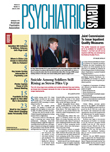People with rheumatic diseases are more likely to develop severe psychiatric disorders than the general population is, a study reported in the May Archives of General Psychiatry has found.
Although previous studies have examined possible links between rheumatic diseases and psychiatric disorders, this is the first one that has tackled the subject in an entire country—Sweden.
Kristina Sundquist, M.D., Ph.D., a professor of family medicine at the Karolinska Institute in Sweden, and coworkers first calculated how many Swedes between 1973 and 2004, that is, a 31-year span, had been hospitalized for any one of three rheumatic diseases—ankylosing spondylitis, systemic lupus erythematosus, or rheumatoid arthritis. They found that 59,646 individuals had been so hospitalized. Moreover, the bulk of the patients had been hospitalized for rheumatoid arthritis. The remaining were hospitalized for either ankylosing spondylitis or lupus in about equal numbers.
They found that of the 59,646 individuals who had been hospitalized for a rheumatic disease, 1,653 were subsequently hospitalized for a psychiatric disorder. The researchers then compared the rates of hospitalization for a psychiatric disorder in their rheumatic-disease population with the rates in the general Swedish population during the same period, taking some possibly confounding factors such as age and gender into consideration. They found that the rates for the rheumatic group were higher than those for the general population. Overall, the highest rates were found for men and women with lupus. Their significant age-standardized incidence ratios were 2.38 and 2.16, respectively.
Moreover, rheumatic subjects' risk of being hospitalized for a psychiatric disorder turned out to be influenced not just by their gender but by the type of rheumatic disease they had. For example, men with lupus, men with ankylosing spondylitis, and both men and women with rheumatoid arthritis had a heightened risk of being hospitalized for an affective or personality disorder. In contrast, women with ankylosing spondylitis had a heightened risk of being hospitalized only for an affective disorder, and women with lupus had a heightened risk of being hospitalized for an affective disorder, a personality disorder, or a psychotic disorder.
Although the study was not able to demonstrate definitively that the rheumatic diseases in question led to the psychiatric illnesses in question, Sundquist believes that was the case. She told Psychiatric News,“ I believe that possible pathways behind this causal link are psychological and immune mechanisms.”
Another reason to believe that the rheumatic diseases in question led to the psychiatric illnesses was the researchers' discovery that the strongest links between the two emerged when the interval between them was less than a year.
These findings are largely consistent with those obtained in other countries, Sundquist and her colleagues pointed out in their study report.
The study was funded by the Swedish Research Council and the Stockholm County Council.
